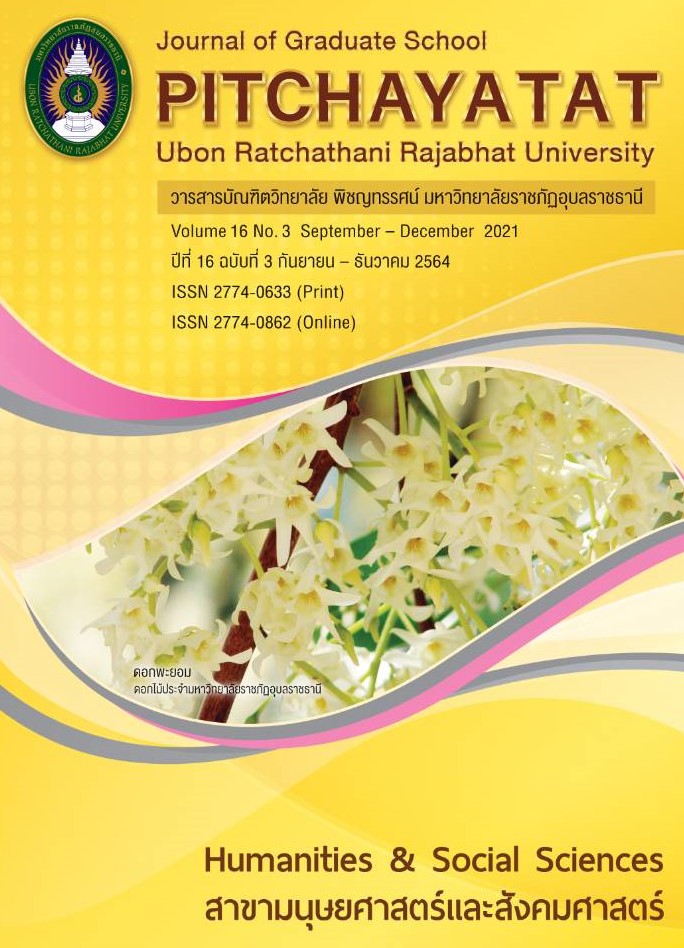โรคสมาธิสั้นในเด็กนักเรียน: บทบาทครูและแนวทางการช่วยเหลือในโรงเรียน
คำสำคัญ:
โรคสมาธิสั้น, การช่วยเหลือ, การพัฒนาทักษะบทคัดย่อ
สมาธิสั้น เป็นกลุ่มอาการที่แสดงให้เห็นได้ตั้งแต่วัยเด็ก เกิดจากความผิดปกติในการทำงานของสมอง ซึ่งส่งผลต่อพฤติกรรม อารมณ์ การเข้าสังคม และการเรียนรู้ของเด็ก ประกอบด้วย 3 กลุ่มอาการหลัก คือ อาการขาดสมาธิ (Inattention) อาการซน อยู่ไม่นิ่ง (Hyperactivity) และอาการหุนหันพลันแล่น (Impulsiveness) โดยเริ่มแสดงอาการตั้งแต่ในวัยเด็ก และส่วนใหญ่มักเป็นต่อเนื่องไปจนถึงวัยรุ่นหรือวัยผู้ใหญ่หากไม่ได้รับการรักษาช่วยเหลือที่ดีอาการความผิดปกติที่เป็นจะทำให้เกิดผลกระทบทั้งในด้านการเรียน อาชีพ ครอบครัว และสังคม การรักษาโรคสมาธิสั้นต้องอาศัยการช่วยเหลือหลายวิธีร่วมกัน ได้แก่ การให้คำแนะนำแก่พ่อแม่ การช่วยเหลือทางด้านจิตใจ การช่วยเหลือในด้านการเรียน และการใช้ยาจากแพทย์
บทบาทครูการช่วยแก้ปัญหาในการเรียน ถ้าสามารถหาสาเหตุและได้รับการแก้ไขในแนวทางที่ถูกต้องก็จะช่วยให้เด็กสามารถเรียนรู้ได้เต็มตามศักยภาพและเหมาะสมตามวัยสมาธิสั้น โรงเรียนควรสร้างสัมพันธภาพที่ดีระหว่างครูกับเด็ก การสร้างบรรยากาศการเรียนรู้ที่เป็นมิตร การเป็นต้นแบบที่ดี (Role model) ในการเคารพความเป็นมนุษย์ การเห็นคุณค่าในความพยายามเปลี่ยนแปลง การรู้จักชื่นชมในจุดดีมากกว่าจ้องจับผิดของครู แต่ถ้าปล่อยทิ้งไว้ก็จะส่งผลกระทบอย่างมากมายได้เช่นกันเนื่องจากสมาธิเป็นปัจจัยที่สำคัญในการเรียนรู้และการใช้ชีวิตประจำวันต่อไป
เอกสารอ้างอิง
ชาญวิทย์ พรนภดล และคณะ. “การพัฒนาแบบคัดกรองโรคสมาธิสั้นในเด็กและวัยรุ่นไทย อายุระหว่าง 3-18 ปี,” สมาคมจิตแพทย์แห่งประเทศไทย. 59, 4 (ตุลาคม-ธันวาคม 2557): 335-344.
ทวีศักดิ์ สิริรัตน์เรขา. สมาธิสั้น. (ออนไลน์) 2560 (อ้างเมื่อ 5 มิถุนายน 2550). จากhttp://www.happyhomeclinic.com/sp03-adhd.htm
ทวีศิลป์ วิษณุโยธิน และคณะ. “ความชุกโรคสมาธิสั้นในประเทศไทย,” สมาคมจิตแพทย์แห่งประเทศไทย. 21, 2 (เมษายน-มิถุนายน 2557): 66–75.
เบญจรัตน์ นุชนาฏ์. พัฒนาการของเด็กวัยเรียน 6 – 12 ปี. (ออนไลน์) 2561 (อ้างเมื่อ 5 ธันวาคม 2563). จาก https://www.gotoknow.org/posts/305008.
พัฒนาการเด็กราชนครินทร์, สถาบัน. คู่มือความรู้ความเข้าใจเกี่ยวกับโรคสมาธิสั้น และบทบาทของครูในการดูแลเด็กที่มีอาการสมาธิสั้น. กรุงเทพฯ: สยามพิมพ์นานา, 2560.
วิจัยประชากรและสังคม, สถาบัน. ประชากรของประเทศไทย พ.ศ.2561. (ออนไลน์) 2560 (อ้างเมื่อ 4 พฤศจิกายน 2563). จาก http://www.ipsr.mahidol.ac.th/ipsrbeta/th/gazette.aspx.
วิฐารณ บุญสิทธิ. (2555). “โรคสมาธิสั้น: การวินิจฉัยและรักษา,” สมาคมจิตแพทย์แห่งประเทศไทย 2555. 57, 4 (ตุลาคม-ธันวาคม 2555): 373-386.
สุขภาพจิต กระทรวงสาธารณสุข, กรม. พระราชบัญญัติสุขภาพจิต พ.ศ. 2551 และที่แก้ไขเพิ่มเติม (ฉบับที่ 2) พ.ศ. 2562. กรุงเทพฯ: ละม่อม จำกัด, 2563.
ADHD Institute. Burden of ADHD 2018. (online) 2018 (cited 5 June 2018). Available from: http://adhd-institute.com/burden-of-adhd/impact-of-adhd/social-impact/.
Harpin, VA. (2005). “The effect of ADHD on the life of an individual, their family, and community from preschool to adult life,” Archives of Disease in Childhood. 90, 3 (May 2007): i2-i7.
Puthisri, S. and S. Yingsaree. “The prevalence of psychiatric disorders,” Journal of the Psychiatric Association of Thailand. 49, 1 (March 2003): 213-222.
Piyasil, V. and P. Katumarn. Textbook of child and adolescent psychiatry. 2nd ed. Bangkok: Tana Press, 2007.
Polanczyk, G. Et al. “The worldwide prevalence of ADHD: a systematic review and metaregression analysis,” The American Journal of Psychiatry. 164, 6 (July 2007): 942-948.
ดาวน์โหลด
เผยแพร่แล้ว
รูปแบบการอ้างอิง
ฉบับ
ประเภทบทความ
สัญญาอนุญาต
ลิขสิทธิ์ (c) 2021 วารสารบัณฑิตวิทยาลัย พิชญทรรศน์ มหาวิทยาลัยราชภัฏอุบลราชธานี

อนุญาตภายใต้เงื่อนไข Creative Commons Attribution-NonCommercial-NoDerivatives 4.0 International License.
บทความทุกเรื่องได้รับการตรวจความถูกต้องทางวิชาการโดยผู้ทรงคุณวุฒิภายนอกอย่างน้อย 3 คน ความคิดเห็นในวารสารพิชญทรรศน์เป็นความคิดเห็นของผู้นิพนธ์มิใช่ความคิดเห็นของผู้จัดทำ จึงมิใช่ความรับผิดชอบของวารสารพิชญทรรศน์ และบทความในวารสารพิชญทรรศน์สงวนสิทธิ์ตามกฎหมายไทย การจะนำไปเผยแพร่ต้องได้รับอนุญาตเป็นลายลักษณ์อักษรจากกองบรรณาธิการ





